
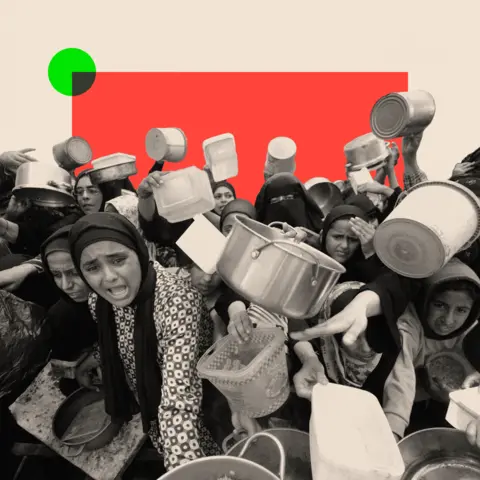 BBC
BBCEven wars have rules. They don’t stop soldiers killing each other but they’re intended to make sure that civilians caught up in the fighting are treated humanely and protected from as much danger as possible. The rules apply equally to all sides.
If one side has suffered a brutal surprise attack that killed hundreds of civilians, as Israel did on 7 October 2023, it does not get an exemption from the law. The protection of civilians is a legal requirement in a battle plan.
That, at least, is the theory behind the Geneva Conventions. The latest version, the fourth, was formulated and adopted after World War Two to stop its slaughter and cruelty to civilians from ever happening again.
At the headquarters of the International Committee of the Red Cross in Geneva (ICRC) the words “Even Wars Have Rules” are emblazoned in huge letters on a glass rotunda.
The reminder is timely because the rules are being broken.
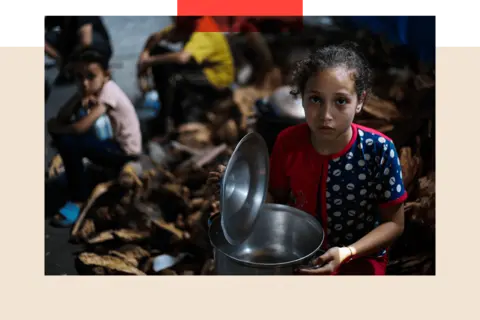 AFP/ Getty Images
AFP/ Getty ImagesGetting information from Gaza is difficult. It is a lethal warzone. At least 181 journalists and media workers have been killed since the war started, almost all Palestinians in Gaza, according to the Committee to Protect Journalists. Israel won’t let international news teams into Gaza.
Since the best way to check controversial and difficult stories is first hand, that means the fog of war, always hard to penetrate, is as thick as I have ever experienced in a lifetime of war reporting.
It is clear that Israel wants it to be that way. A few days into the war I was part of a convoy of journalists escorted by the army into the border communities that Hamas had attacked, while rescue workers were recovering the bodies of Israelis from smoking ruins of their homes, and Israeli paratroopers were still clearing buildings with bursts of gunfire.
Israel wanted us to see what Hamas had done. The conclusion has to be that it does not want foreign reporters to see what it is doing in Gaza.
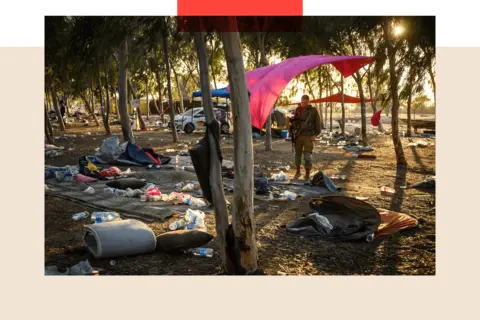 Getty Images
Getty ImagesTo find an alternative route through that fog, we decided to approach it through the prism of laws that are supposed to regulate warfare and protect civilians. I went to the ICRC headquarters as it is the custodian of the Geneva Conventions.
I have also spoken to distinguished lawyers; to humanitarians with years of experience of working within the law to bring aid to Gaza and other warzones; and to senior Western diplomats about their governments’ growing nervousness that they might be complicit in future criminal investigations if they do not speak up about the catastrophe inside Gaza.
In Europe there is also now a widely held belief, as in Israel, that Prime Minister Benjamin Netanyahu is prolonging the war not to safeguard Israelis, but to preserve the ultra-nationalist coalition that keeps him in power.
As prime minister he can prevent a national inquiry into his role in security failures that gave Hamas its opportunity before 7 October and slow down his long-running trial on serious corruption charges that could land him in jail.
Netanyahu rarely gives interviews or news conferences. He prefers direct statements filmed and posted on social media. Israeli Foreign Minister Gideon Sa’ar declined a request for an interview.
Boaz Bismuth, a parliamentarian from Netanyahu’s Likud party, repeated his leader’s positions: that there is no famine in Gaza, that Israel respects the laws of war and that unwarranted criticism of its conduct by countries including the UK, France and Canada incites antisemitic attacks on Jews, including murder.
Lawyers I have spoken to believe that there is evidence that Israel followed war crimes, committed by Hamas when it attacked Israel, with very many of its own, including the crime of genocide.
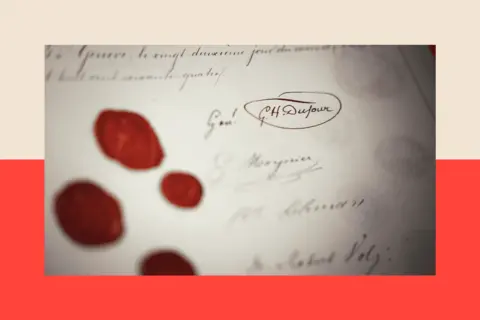 BBC / Matt Goddard
BBC / Matt GoddardIt is clear that Israel has hard questions to answer that will not go away.
It also faces a legal process alleging genocide at the International Court of Justice and has a prime minister with limited travel options as he faces a warrant for arrest on war crimes charges issued by the International Criminal Court (ICC).
Rival politicians inside Israel accuse Netanyahu of presiding over war crimes and turning Israel into a pariah state.
He has pushed back hard, comparing himself – when the warrant was issued – to Alfred Dreyfus, the Jewish officer wrongly convicted of treason in an antisemitic scandal that rocked France in the 1890s.
Evidence in the numbers
The evidence of what is happening in Gaza starts with the numbers. On 7 October 2023 Hamas broke into Israel, killing 1,200 people. More than 800 were Israeli civilians. The others were members of Israel’s security forces, first responders and foreign workers. Around 250 people, including non-Israelis, were dragged back into Gaza as hostages.
Figures vary slightly, but it is believed that 54 hostages remain in Gaza, of whom 31 are believed to be dead.
Collating the huge total of Palestinian casualties inside Gaza is much more difficult. Israel restricts movement inside Gaza and much of the north of the strip cannot be reached.
The latest figures from the ministry of health in Gaza record that Israel killed at least 54,607 Palestinians and wounded 125,341 between the 7 October attacks and 4 June this year. Its figures do not separate civilians from members of Hamas and other armed groups.
According to Unicef, by January this year 14,500 Palestinian children in Gaza had been killed by Israel; 17,000 are separated from their parents or orphaned; and Gaza has the highest percentage of child amputees in the world.
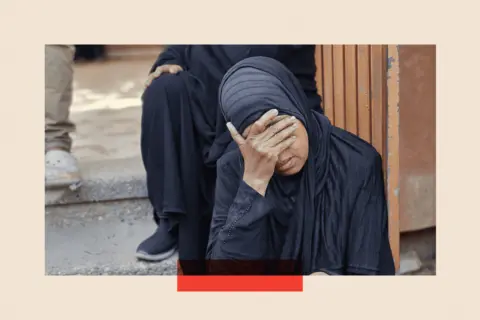 Anadalou/ Getty Images
Anadalou/ Getty ImagesIsrael and the US have tried to spread doubt about the casualty reports from the ministry, because like the rest of the fragments of governance left in Gaza, it is controlled by Hamas. But the ministry’s figures are used by the UN, foreign diplomats and even, according to reports in Israel, the country’s own intelligence services.
When the work of the ministry’s statisticians was checked after previous wars, it tallied with other estimates.
A study in medical journal The Lancet argues that the ministry underestimates the numbers killed by Israel, in part because its figures are incomplete. Thousands are buried under rubble of destroyed buildings and thousands more will die slowly of illnesses that would have been curable had they had access to medical care.
Gaza’s civilians had some respite during a ceasefire earlier this year. But when negotiations on a longer-term deal failed, Israel went back to war on 18 March with a series of huge air strikes and since then a new military offensive, which the prime minister says will finally deliver the elusive “total victory” over Hamas that he promised on 7 October 2023.
Israel has put severe restrictions on food and aid shipments into Gaza throughout the war and blocked them entirely from March to May this year. With Gaza on the brink of famine, it is clear that Israel has violated laws that say civilians should be protected, not starved.
A British government minister told the BBC that Israel was using hunger “as a weapon of war”. The Israeli Defence Minister, Israel Katz, said openly that the food blockade was a “main pressure lever” against Hamas to release the hostages and accept defeat.
Weaponising food is a war crime.
A failure of humanity
War is always savage. I was in Geneva to see Mirjana Spoljarić, the Swiss diplomat who is president of the ICRC. She believes it can get even worse; that there is no doubt that Israel is flouting the Geneva Conventions in Gaza and this sends a message that the rules of war can be ignored in conflicts across the world.
After we walked past glass cases displaying the ICRC’s three Nobel peace prizes and handwritten copperplate reproductions of the Geneva Conventions, she warned that “we are hollowing out the very rules that protect the fundamental rights of every human being”.
We sat down to talk in a room with one of Europe’s most serene views: the tranquillity of Lake Geneva and the magnificent sprawl of the Mont-Blanc massif.
But for Ms Spoljarić, constantly aware of the ICRC’s role as custodian of the Geneva Conventions, the view beyond the Alps and across the Mediterranean to Gaza is alarming. She has been in Gaza twice this year and says that it is worse than hell on earth.
“Humanity is failing in Gaza,” Ms Spoljarić told me. “It is failing. We cannot continue to watch what is happening. It’s surpassing any acceptable, legal, moral, and humane standard. The level of destruction, the level of suffering.”
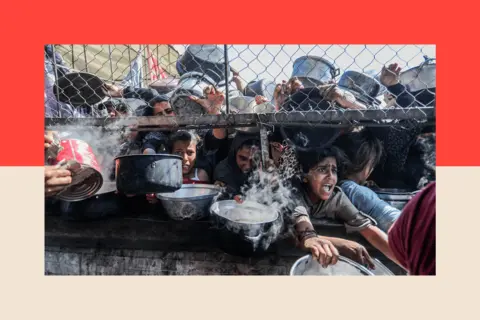 Anadalou/ Getty Images
Anadalou/ Getty ImagesMore importantly, she says, the world is watching an entire people, the Palestinians, being stripped of their human dignity.
“It should really shock our collective conscience… It will haunt us. We are seeing things happening that will make the world an unhappier place far beyond the region.”
I asked her about Israel’s justification that it is acting in self-defence to destroy a terrorist organisation that attacked and killed its people on 7 October.
“It is no justification for a disrespect or for a hollowing out of the Geneva Conventions,” she said. “Neither party is allowed to break the rules, no matter what, and this is important because, look, the same rules apply to every human being under the Geneva Convention.
“A child in Gaza has exactly the same protections under the Geneva Conventions as a child in Israel.”
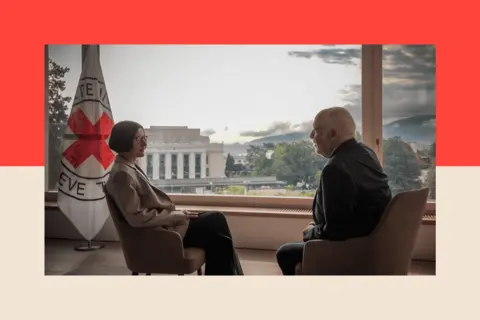 BBC / Matt Goddard
BBC / Matt GoddardMirjana Spoljarić spoke quietly, with intense moral clarity. The ICRC considers itself a neutral organisation; in wars it tries to work even-handedly with all sides.
She was not neutral about the rights all human beings should enjoy, and is deeply concerned that those rights are being damaged by the disregard of the rules of war in Gaza.
‘We will turn them into rubble’
On the evening of 7 October 2023, while Israel’s troops were still fighting to drive Hamas invaders out of its border communities, Benjamin Netanyahu delivered a brief video address to the Israeli people and the watching world.
Speaking from Israel’s military command centre in the heart of Tel Aviv, he chose words that would reassure Israelis and induce dread in their enemies. They were also a window into his thinking about the way that the war should be fought, and how Israel would defend its military choices against criticism.
The fate of Hamas was sealed, he promised. “We will destroy them and we will forcefully avenge this dark day that they have forced on the State of Israel and its citizens.
“All of the places which Hamas is deployed, hiding and operating in, that wicked city, we will turn them into rubble.”
Netanyahu praised allies who were rallying around Israel, singling out the US, France and the UK for their “unreserved support”. He had spoken to them, he said, “to ensure freedom of action”.
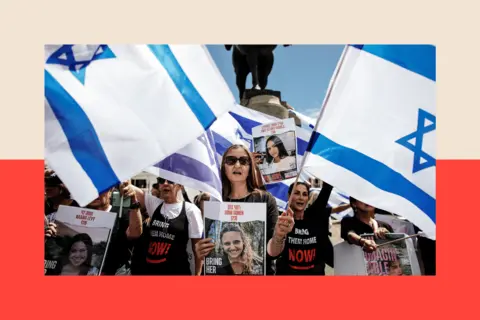 AFP/ Getty Images
AFP/ Getty ImagesBut in war freedom of action has legal limits. States can fight, but it must be proportionate to the threat that they face, and civilian lives must be protected.
“You’re never entitled to break the law,” says Janina Dill, professor of global security at Oxford University’s Blavatnik School.
“How Israel conducts this war is an entirely separate legal analysis… The same, by the way, is true in terms of resistance to occupation. October 7 was not an appropriate exercise [by Hamas] of the right of resistance to occupation either.
“So, you can have the overall right of self-defence or resistance. And then how you exercise that right is subject to separate rules. And having a really good cause in war legally doesn’t give you additional licence to use additional violence.
“The rules on how wars are conducted are the rules for everybody regardless of why they are in the war.”
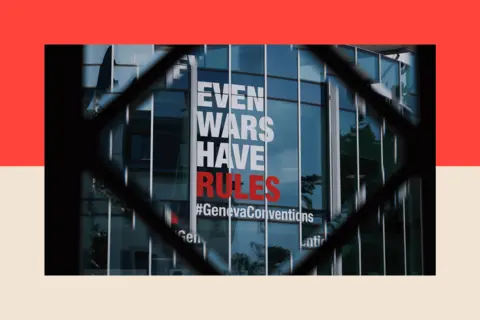
What a difference time and death make in war. Twenty months after Netanyahu’s speech, Israel has exhausted a deep reservoir of goodwill and support among many of its friends in Europe and Canada.
Israel always had its critics and enemies. The difference now is that some countries and individuals who consider themselves friends and allies no longer support the way Israel has been fighting the war. In particular, the restrictions on food aid that respected international assessments say have brought Gaza to the brink of famine, as well as a growing stack of evidence of war crimes against Palestinian civilians.
“I’m shaken to my core,” Jan Egeland, the veteran head of the Norwegian Refugee Council and former UN humanitarian chief, told me. “I haven’t seen a population like this being so trapped for such a long period of time in such a small, besieged area. Indiscriminate bombardment, denied journalism, denied healthcare.
“It is only comparable to the besieged areas of Syria during the Assad regime, which led to a uniform Western condemnation and massive sanctions. In this case, very little has happened.”
But now the UK, France and Canada want an immediate halt to Israel’s latest offensive.
On 19 May, prime ministers Sir Keir Starmer and Mark Carney, and President Emmanuel Macron, stated, “We have always supported Israel’s right to defend Israelis against terrorism. But this escalation is wholly disproportionate… We will not stand by while the Netanyahu Government pursues these egregious actions.”
Sanctions may be coming. The UK and France are actively discussing the circumstances in which they would be prepared to recognise Palestine as an independent state.
War and revenge
Netanyahu quoted from a poem by Hayim Nahman Bialik, Israel’s national poet, in his TV speech to the Israeli people on 7 October as they wrestled with fear, anger and trauma.
He chose the line: “Revenge for the blood of a little child has yet to be devised by Satan.”
It comes from In the City of Slaughter, which is widely regarded as the most significant Hebrew poem of the 20th Century. Bialek wrote it as a young man in 1903, after he had visited the scene of a pogrom against Jews in Kishinev, a town then in imperial Russia and now called Chişinǎu, the capital of present-day Moldova. Over three days, Christian mobs murdered 49 Jews and raped at least 600 Jewish women.
Antisemitic brutality and killing in Europe was a major reason why Zionist Jews wanted to settle in Palestine to build their own state, in what they regarded as their historic homeland. Their ambition clashed with the desire of Palestinian Arabs to keep their land. Britain, the colonial power, did much to make their conflict worse.
By 1929 Vincent Sheean, an American journalist, was describing Jerusalem in a way that is grimly familiar to reporters there almost a century later. “The situation here is awful,” he wrote. “Every day I expect the worst.”
He added that violence was in the air, “The temperature rose – you could stick your hand out in the air and feel it rising.”
Sheean’s account of the 1920s illustrates the conflict’s deep root system in the land that Israelis and Palestinians both want and have not found a way, or a will, to share or separate.
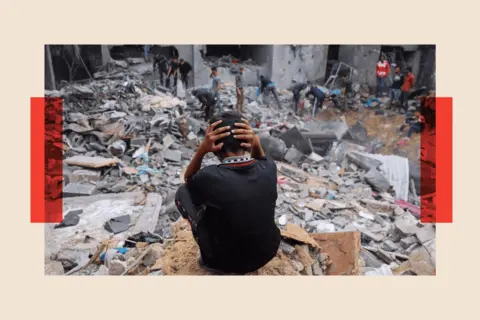 Getty Images
Getty ImagesPalestinians see a direct line between the Gaza war and the destruction of their society in 1948 when Israel became independent, which they call the Catastrophe. But Netanyahu, and many other Israelis and their supporters abroad connected the October attacks to the centuries of persecution Jews suffered in Europe, which culminated with Nazi Germany killing six million Jews in the Holocaust.
Netanyahu used the same references to hit back when Macron said in May that the Israeli blockade of Gaza was “shameful” and “unacceptable”.
Netanyahu said that Macron had “once again chosen to side with a murderous Islamist terrorist organisation and echo its despicable propaganda, accusing Israel of blood libels”.
The blood libel is a notorious antisemitic trope that goes back to medieval Europe, falsely accusing Jews of killing Christians, especially children, to use their blood in religious rituals.
After a couple who worked for the Israeli embassy in Washington DC were shot dead, the gunman told police, “I did it for Palestine, I did it for Gaza.” Netanyahu connected the murders with the criticisms of Israel’s conduct made by the leaders of the UK, France and Canada.
In a video posted on X, he declared: “I say to President Macron, Prime Minister Carney and Prime Minister Starmer: When mass murderers, rapists, baby killers and kidnappers thank you, you’re on the wrong side of justice. You’re on the wrong side of humanity, and you’re on the wrong side of history.
“For 18 years, we had a de facto Palestinian state. It’s called Gaza. And what did we get? Peace? No. We got the most savage slaughter of Jews since the Holocaust.”
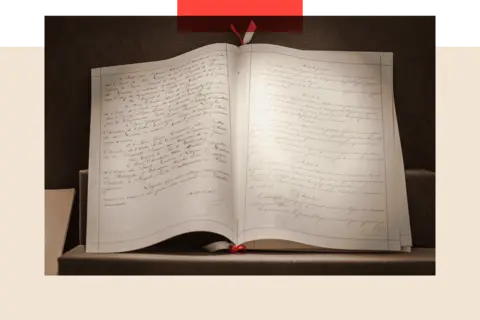 BBC / Matt Goddard
BBC / Matt GoddardNetanyahu has also referred to the long history of antisemitism in Europe when warrants calling for his arrest, along with his former defence minister Yoav Gallant, who was defence minister for the first 13 months of the war, were issued by the International Criminal Court (ICC) in The Hague.
The court had also issued arrest warrants for three Hamas leaders, including Yahya Sinwar, considered the mastermind behind 7 October. All three have since been killed by Israel.
A panel of ICC judges decided that there were “reasonable grounds” to believe that Netanyahu and Gallant bore criminal responsibility. “As co-perpetrators for committing the acts jointly with others: the war crime of starvation as a method of warfare; and the crimes against humanity of murder, persecution, and other inhumane acts.”
In a defiant statement, Netanyahu rejected “false and absurd charges”. He compared the ICC to the antisemitic conspiracy that sent Alfred Dreyfus, a Jewish officer in the French army, to the penal colony on Devil’s Island for treason in 1894. Dreyfus, who was innocent, was eventually pardoned but the affair caused a major political crisis.
“The antisemitic decision of the International Criminal Court is a modern Dreyfus trial – and will end the same way,” the statement said.
“No war is more just than the war Israel has been waging in Gaza since October 7th 2023, when the Hamas terrorist organisation launched a murderous assault and perpetrated the largest massacre against the Jewish People since the Holocaust.”
The legacy of persecution
British barrister Helena Kennedy KC was on a panel that was asked by the ICC’s chief prosecutor to assess the evidence against Netanyahu and Gallant. Baroness Kennedy and her colleagues, all distinguished jurists, decided that there were reasonable grounds to go ahead with the warrants. She rejects the accusation that the court and the prosecutor were motivated by antisemitism.
“We’ve got to always remember the horrors that the Jewish community have suffered over centuries,” she told me at her chambers in London. “The world is right to feel a great compassion for the Jewish experience.”
But a history of persecution did not, she said, give Israel licence to do what it’s doing in Gaza.
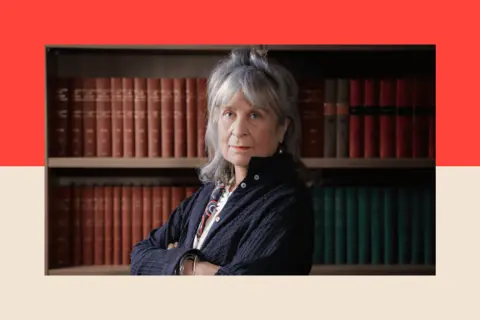 BBC / Matt Goddard
BBC / Matt Goddard“The Holocaust has filled us all with a high sense of guilt, and so it should because we were complicit. But it also teaches us the lesson that we mustn’t be complicit now when we see crimes being committed.
“You have to conduct a war according to law, and I’m a firm believer that the only way that you ever create peace is by behaving in just ways, and justice is fundamental to all of this. And I’m afraid that we’re not seeing that.”
Stronger words came from Danny Blatman, an Israeli historian of the Holocaust and head of the Institute of Contemporary Jewry at Hebrew University in Jerusalem.
Prof Blatman, who is the son of Holocaust survivors, says that Israeli politicians have for many years used the memory of the Holocaust as “a tool to attack governments and public opinion in the world, and warn them that accusing Israel of any atrocities towards the Palestinians is antisemitism”.
The result he says is that potential critics “shut their mouths because they’re afraid of being attacked by Israelis, by politicians as antisemites”.
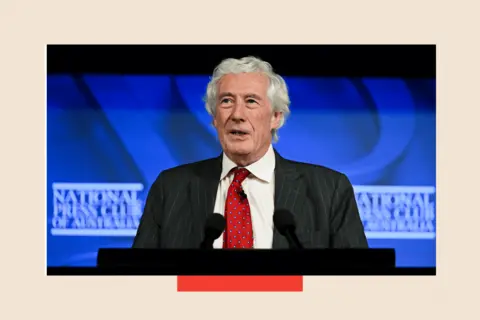 EPA
EPALord Sumption, a former justice of the Supreme Court of the United Kingdom, believes Israel should have learned from its own history.
“The terrible Jewish experience of persecution and mass killing in the past should give Israel a horror of inflicting the same things on other peoples.”
History is inescapable in the Middle East, always present, a storehouse of justification to be plundered.
America: Israel’s vital ally
Israel could not wage war in Gaza using its chosen tactics without American military, financial and diplomatic support. President Donald Trump has shown signs of impatience, forcing Netanyahu to allow a few cracks in the siege that has brought Gaza to the edge of famine.
Netanyahu himself continues to express support for Trump’s widely condemned proposal to turn Gaza into “the Riviera of the Mediterranean”, by emptying it of Palestinians and turning it over to the Americans for redevelopment. That is code for the mass expulsion of Palestinians, which would be a war crime. Netanyahu’s ultra-nationalist allies want to replace them with Jewish settlers.
Trump himself seems silent about the plan. But the Trump administration’s support for Israel, and its actions in Gaza, looks undiminished.
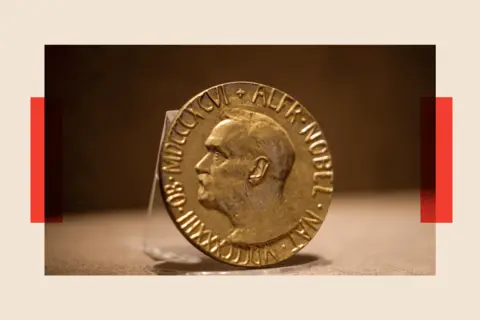 BBC / Matt Goddard
BBC / Matt GoddardOn 4 June, the US vetoed a UN Security Council resolution calling for an “unconditional and permanent” ceasefire, the release of all the hostages and the lifting of restrictions on humanitarian aid. The other 14 members voted in favour. The next day the Americans sanctioned four judges from the ICC in retaliation for the decision to issue arrest warrants.
US Secretary of State Marco Rubio said he was protecting the sovereignty of the US and Israel against “illegitimate actions”.
“I call on the countries that still support the ICC, many of whose freedom was purchased at the price of great American sacrifices to fight this disgraceful attack on our nation and Israel.”
Instead the ICC has had statements of support and solidarity from European leaders. A broad and increasingly bitter gap has opened up between the US and Europe over the Gaza war, and over the legitimacy of criticising Israel’s conduct.
Israel and the Trump administration reject the idea that the laws of war apply equally to all sides, because they claim it implies a false and wrong equivalence between Hamas and Israel.
Jan Egeland can see the split between Europe and the US growing.
“I hope now that Europe will grow a spine,” he says. “There have been new tones, finally, coming from London, from Berlin, from Paris, from Brussels, after all these months of industrial-scale hypocrisy where they didn’t see that there was a world record in killed aid workers, in killed nurses, in killed doctors, in killed teachers, in killed children, and all while journalists like yourself have been denied access, denied to be witnessing this.
“It’s something that the West will learn to regret really — that they were so spineless.”
The question of genocide
The question of whether Israel is committing genocide in Gaza outrages Israel and its supporters, led by the United States. Lawyers who believe the evidence does not support the accusation have stood up to oppose the case brought by South Africa at the International Court of Justice (ICJ) alleging genocide against Palestinians.
But it will not go away.
The Netanyahu loyalist Boaz Bismuth answered the genocide question like this.
“How can you accuse us of genocide when the Palestinian population grew, I don’t know how many times more? How can you accuse me of ethnic cleansing when I’m moving [the] population inside Gaza to protect them? How can you accuse me when I lose soldiers in order to protect my enemies?”
It is hard to prove genocide has happened; the legal bar prosecutors have to clear has been set deliberately high. But leading lawyers who have spent decades assessing matters of legal fact to see if there is a case to answer believe it is not necessary to wait for the process started in January last year by South Africa to make a years-long progress through the ICJ.
We asked Lord Sumption, the former Supreme Court justice, for his opinion.
“Genocide is a question of intent,” he wrote. “It means killing, maiming or imposing intolerable conditions on a national or ethnic group with intent to destroy them in whole or in part.
“Statements by Netanyahu and his ministers suggest that the object of current operations is to force the Arab population of Gaza to leave by killing and starving them if they stay. These things make genocide the most plausible explanation for what is now happening.”
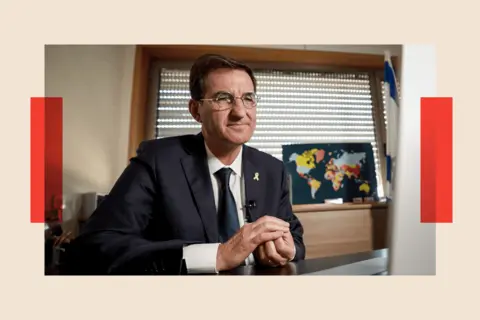 BBC / Matt Goddard
BBC / Matt GoddardSouth Africa based much of its genocide case against Israel on inflammatory language used by Israeli leaders. One example was the biblical reference Netanyahu used when Israel sent troops into Gaza, comparing Hamas to Amalek. In the Bible God commands the Israelites to destroy their persecutors, the Amalekites.
Another was Defence Minister Yoav Gallant’s declaration just after the Hamas attacks when he ordered a complete siege on the Gaza Strip: “There will be no electricity, no food, no fuel, everything is closed. We are fighting human animals and we act accordingly.”
Ralph Wilde, UCL professor of law, also believes there is proof of genocide. “Unfortunately, yes, and there is now no doubt legally as to that, and indeed that has been the case for some time.”
He points out that an advisory opinion of the ICJ has already determined that Israel’s presence in Gaza and the West Bank was illegal. Prof Wilde compares Western governments’ responses to the war in Gaza to Russia’s full-scale invasion of Ukraine in 2022.
“There has been no court decision as to the illegality of Russia’s action in Ukraine. Nonetheless, states have found it possible already to make public proclamations determining the illegality of that action. There is nothing stopping them doing that in this case.
“And so, if they are suggesting that they are going to wait, the question to ask them is, why are you waiting for a court to tell you what you already know?”
Helena Kennedy KC is “very anxious about the casual use of the word genocide and I avoid it myself because I do think that there has to be a very high level in law, a very level of intent necessary to prove it”.
“Are we saying that it’s not genocide but it is crimes against humanity? You think that makes it sound okay? Terrible crimes against humanity? I think we’re in the process of seeing the most grievous kind of crimes taking place.
“I do think we’re on a trajectory that could very easily be towards genocide, and as a lawyer I think that there’s certainly an argument that is being made strongly for that.”
Baroness Kennedy says her advice to the British government if it was asked for would be, “We’ve got to be very careful about being complicit in grievous crimes ourselves.”
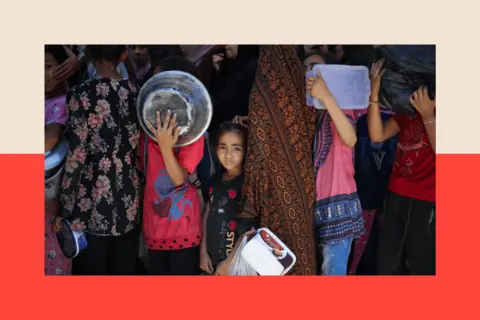 Getty Images
Getty ImagesEventually, a ceasefire will come. It will not end the conflict, or head off the certainty of a long and bitter epilogue. The genocide case at the ICJ guarantees that. So do the International Criminal Court’s arrest warrants against Benjamin Netanyahu and Yoav Gallant.
Once journalists and war crimes investigators can get into the Gaza Strip, they will emerge with more hard facts about what has happened.
Those who have been into Gaza with the UN or medical teams say that even people who have seen many wars find it hard to grasp the extent of the damage; so many islands of human misery in an ocean of rubble.
I keep thinking about something an Israeli officer said the only time I’ve been into Gaza since the war started. I spent a few hours in the ruins with the Israeli army, one month into the war, when it had already made northern Gaza into a wasteland
He started telling me how they did their best to not to fire on Palestinian civilians. Then he trailed off, and paused, and told me no-one in Gaza could be innocent because they all supported Hamas.
BBC InDepth is the home on the website and app for the best analysis, with fresh perspectives that challenge assumptions and deep reporting on the biggest issues of the day. And we showcase thought-provoking content from across BBC Sounds and iPlayer too. You can send us your feedback on the InDepth section by clicking on the button below.

